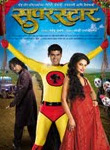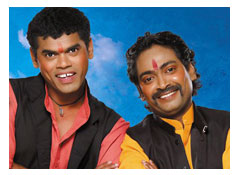Impressive ‘Deool’ ends without suitable climax
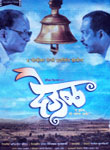 |
Rating: na
Producer: Abhijit Gholap, Devisha Films Director: Umesh Vinayak Kulkarni Screenplay, Dialogues: Girish Kulkarni Music: Mangesh Dhakade Lyrics: Swanand Kirkire, Sudhir Moghe Cast: Dilip Prabhavalkar, Nana Patekar, Girish Kulkarni, Mohan Agashe, Atisha Naik, Sonali Kulkarni, Kishor Kadam, Jyoti Subhash, Hrishikesh Joshi, Vibhavari Deshpande Movie Review by: Ulhas Shirke |
After two sensible films ‘Valu’ and ‘Vihir’, the team of Umesh Kulkarni and Girish Kulkarni unite once again with their artistic work, through their latest released film ‘Deool’.
Besides perfect presentation of a village life supported by superb portrayal of characters by versatile artistes,’Deool’ successfully manages to depict the image of today’s rural India and the effect of globalisation on the lives of the people living there.
The film revolves around one such village Umbra in Maharashtra, which is otherwise peaceful and slow moving in progress, having been exploited by a local politician Bhau ( Nana Patekar), who is a tool at the hands of his party chief ( Mohan Agashe). Bhau cleverly manages the people from the village, including the lady Sarpanch (Atisha Naik) and proves how liberal he is, in treating the women folks. He also keeps his wife (Sonali Kulkarni) happy but sends his two daughters to Boarding school to keep them away from village life.
Bhau, respects the only educated and sensible senior citizen Anna( Dilip Prabhavalkar) , who lives all alone with his son and his family living in Bangaluru. When Anna comes up with a hospital project for the benefit of villagers, Bhau supports his idea and agrees to find finance through his party chief. In the meanwhile, a young labourer Keshav, working at Bhau’s house sees Lord Dattaguru in his dreams, while he takes a nap in the deserted place below a tree, after searching for his missing cow. When he wakes up, he is all excited and starts disclosing this miracle to whoever he comes across, on his way back home.
When Keshav narrates this incidence to Anna, he advises him not to disclose it to anyone and suggests him to keep his faith to his own self. But, the news spreads to the village and a Journalist who is a friend of the youths from the village including the nephew of Bhau, suggests them to sensationalize this matter. He convinces Bhau’s nephew and other friends the importance of this news and suggests them to turn this villlgae into a pilgrim centre. Bhau’s nephew goes one step ahead of his uncle and takes the Party chief into confidence. Bhau has no other way left but to take alongwith him the youth of the village and succumb to their demands. Fed up with this politics Anna decides to leave the village and moves to Bangaluru to join his son. Even Keshav desists himself from the materialistic living of the villagers, especially after the death of his cow.
The excellent realistic presentation of the film in the first half, manages to keep the audience engrossed into their daily life; but after interval slows down a bit with irrelevant scenes. It picks up after those breaks, only to conclude with unexpected climax, which is open ended for the audience to decide.
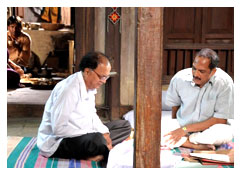
The most sensible person in this film- Anna deciding to quit the village, itself shows the helplessness of sensible people living in this country. The film had ample scope to show that there is law which does not spare those into corrupt practices, as suggested by the character of Anna to Bhau, in one of the scenes; but that does not happen in this film’s climax. There was also scope to show the villagers realising how important it was to have a Hospital project for their village, rather than playing with the sentiments of the devotees. But, that too does not happen in the climax.
The only young man Keshav does his best in his own way, but his efforts don’t bring the desired results. The film therefore does not succeed totally in removing blind faith, but only keeps the reality before the audience. There is no doubt that the selection of artistes for the respective characters is a perfect choice and so are the well written dialogues. Wonderful photography, perfect editing and best sound effect makes this film more presentable technically . Music by Magesh Dhakade is just appropriate for this film.
Direction of Umesh Kulkarni clearly shows, how perfect he has been with his study of village life.There has been lot of hard work during the film’s making, managing such a big team of talented artistes. Lead actor -Nana Patekar rocks in the role of Bhau; but it is Girish Kulkarni, who in the role of Keshav is more impressive. With excellent support coming from a big team of artistes, the film is more like a performance oriented film. Watch the expressions of Mohan Agashe, playing a shrewd politician, watch the body language of Usha Nadkarni, simple but perfect housewife played by Sonali Kulkarni and that guest apperance by Naseeruddin Shah, as a stranger coming to the village; they all are extraordinary!
‘Adgula Madgula’ offers gentle entertainment
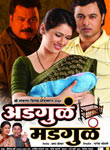 |
Rating: na
Presentor: Shree Sankalp Film Production Producer: Sharad Shelar Director: Nagesh Bhosale Screenplay, Dialogues: Arvind Jagtap Music: Shailendra Barve Camera: Suresh Survarna Cast: Girija Oak, Subodh Bhave, Nagesh Bhosale, Smita Talwalkar, Uday Tikekar, Sandeep Mehta Movie Review by: Ulhas Shirke |
The true story of Sandra Laing – a black girl born to white parents in South africa sometime in 50s did make a news all over the world. Those days, Sandra was refused admission in schools for being black. Her father fought a battle in court and won the same in Supreme Court, after he proved that she was born to white parents. This story was later made into a book, “When She Was White” by Judith Stone, and a British film ‘Skin’ was made in 2009, starring Sophie Okonedo and Sam Neill.
Now, a new Marathi film ‘Adgula Madgula’ deals with a similar kind of theme (not the complete story of the dark girl) but, just showing a dark child born to a fair Kokanastha Brahmin couple. Shounak Pendse belonging to a rich family living in a huge bunglow, marries a fair girl Anuja , well suited to him. Anuja is working in an ad agency with Mr. Lalit ( Nagesh Bhosale) as her boss. After marriage the happy couple have all sorts of fun and live with a cheerful family comprising of Father,mother, sister and Grandfather.
Girija Oak, Subodh BHave Everything goes well, till Anuja delivers a baby boy who turns out to be black. Suddenly, all people around her behave very strangely with her, except the Grandfather and the housemaid. Even her parents do not allow her to come to their place with the baby, fearing comments from the neighbors and visitors. Initially, Shounak suspects his wife having an affair with her friend and goes in serach of the truth . After being convinced, he later doubts her boss. Then, as suggested by his lawyer friend, he tries to do DNA test of father and son to remove all doubts. In the process, he gets caught and the relationship between the husband and wife is further strained. Finally, the director decides to conclude the film in his own style, leaving the audience guessing, what option does the wife have ?
Does she go to her parents for sometime or leaves the house forever? Only, the Boss knows it.

The film does have a good theme but not enough to entertain the audience for two hours. The screenplay which runs for about 105 minutes, offers gentle entertainment, but keeps on revolving around the same plot in the pre interval stage. The clever director has therefore used the clippings of the Goa honeymoon trip of the couple with two songs knitted into it. It is only post interval, some dramatic scenes take place to keep the audience engaged. The film ends suddenly, with unpredictable end, keeping the audience guessing. ‘Adgula Madgula’ is no doubt a sincere effort from the makers, but it could have been more interesting with insertion of more laughter scenes arising out of misunderstandings.
The kind of theme used looks good for a stage play, due to its limited locations. But, the wonderful cinematography by Suresh Suvarna has certainly brought some life into the film. Shailebdra Barve’s music too is well used in the few songs suited for the occasion. Both Subodh Bhave and Girija Oak have given their best through their respective roles. Their intimate scenes look very natural. Smita Talwalkar has enough scope to play a typical selfish mother-in-law. Uday Tikekar playing a undecided father –in-law and Sandeep Mehta as girl’s confused father have limited scope. However, Nagesh Bhosale as the girl’s boss in office, has maximum three to four scenes, but he impresses through them. The other supporting cast is good, but it was a pleasure to watch Yakub Saeed after a long time in the role of a sensible grandfather lost in his own world of music. He did display his ability at this progressing age.
Sensational ‘Arjun’ turns an eye opener
 |
Rating: na
Presentor: Cinematics Multimedia Pvt. Ltd. Producer: Majit Burondkar, F. M. Ilyas Director: F. M. Ilyas Story: F. M. Ilyas Music: Lalit Sen Camera: Ajib Khan Cast: Sachit Patil, Amruta Khanvilkar, Vidyadhar Joshi, Varsha Usgaonkar, Vinay Apte, Arun Nalawade, Uday Tikekar, Snigdha Sabnis, Kamalesh Sawant, Uday Sabnis, Anant Jog, Mamata Soni Movie Review by: Ulhas Shirke |
A man willing to work, and unable to find work, is perhaps the saddest sight that fortune’s inequality exhibits today. At this juncture, when we witness lakhs of youths in Maharashtra unemployed, with no drive among them to enter into business, here comes a new Marathi film ‘Arjun’ with a timely message to inspire all the Marathi youths, in particular. ‘Arjun’ produced by Majid Burondkar and F.M. Ilyas, is written and directed by F.M. Ilays. Based on his real life experiences of struggle to set up his own business during his young days, the writer has presented a gripping story of a well educated protagonist who is exploited by a leading businessman who wants to rule over Mumbai.
Mr. Ilyas presents this sensational story of Arjun Pawar (Sachit Patil) a young boy from middle class family, who after completing his MBA opts for business and is exploited by a shrewd businessman- Ratan Shah (Vidyadhar Joshi) and his agent- Mr. Mahajan (Arun Tikekar) in a busines deal. Arjun is in love with Anushka (Amruta Khanvilakr) who is Mahajan’s daughter; and both want to get married soon. After Amruta proceeds to Australia for an advanced short term course in Management, Mr. Mahajan plays his dirty game with the support of Ratan Shah and uses the project and name of Arjun, while finalising a land deal with Jay Thackeray a businessman and an investor in land.
Interestingly, the character of Jay Thackeray (Vinay Apte) who is strongly in favour of selling his land to a Maharashtrian, refuses to sell it to Ratan Shah, who in turn uses Arjun as a prospective buyer ,with an assurance to finance his project. Jai Thackeray’s wife Maya (Varsha Usgaonkar) also favours Arjun and Jay Thackeray sings a deal.
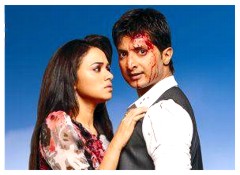
Arjun is later trapped by Ratan Shah with the help of his agent Mahajan and is sent to jail, implicating him in a serious offence. Arjun learns a lesson from this horrible experience and vows to accomplish his mission. At a time, when his mother dies in an accident he receives timely help from a lawyer and financial backing from a person already known to him. His first target becomes Ratan Shah and his business. With his quick thinking, he goes in search of a person well versed with the tricks of stock trading. He finds one in the form of Bajirao Satpute. Bajirao helps him gain control over stock market, the main source of finance for Ratan Shah. He defeats him step by step and also wipes out the charges on him for an offence with the timely help from a honest police officer.
The sequences in the film are not something we haven’t heard of; but, for Marathi audience the script of this film certainly inspires. Through the character of Arjun, the writer-director Illays has tried to build confidence in Marathi youths to enter business in a city like Mumbai, which is a good step. He also shows the way to success. Though there are few scenes moving very fast towards the end , it is the sincerity of the director that shows his commitment towards the issue. He has rightly used Hutatma Chowk during two important sequences, i.e. when Arjun vows to teach a leson to the lobby of businessmen and later during the climax scene.
Perfromances of all the artistes are good. Sachit Patil does well to present the new angry young man of Marathi films. His looks and his spontaneity in important scenes were worth noticing. Amruta Khanvilkar supports him well in this male dominated film. She does well when she confronts with her father after returning from Australia. Uday Tikekar, Vinay Apte, Kamalesh Sawant (as Police officer), Varsha Usgaonkar, Uday Sabnis (Advocate), Dr. Vilas Ujawane (Politician), Arun Nalawade (frustrated but perfect Stock market analyst), Snigdha Sabnis( Mother), Anant Jog(Income tax officer) and Dr. Vilas Ujavane (Politician) perform their limited roles with ease. But, it is the shrewd businessman Ratan Shah played by Vidyadhar Joshi, impresses the most. He has established himself as the new villain of Marathi film industry with his proficiency as a complete actor in this film.
Strong dialogues by Sachin Darekar and punch lines by F.M. Ilyas create that desired impact during forceful confrontations . Music by Lalit Sen is good but one of the four songs was irrelevant and breaks the rhythm of the screenplay. The climax where the hero chases the villain has been shot on the lines of popular Bollywood- hit revenge based films. However, the picturisation of songs and the action scenes are well captured through the lenses of Najib Khan. The finest locations and action sequences, never before seen in Marathi films are the added attractions of the film. Editing work of Faisal and Imran Mahadik is good to give that required pace to this action packed film. There is one more good thing about the film’s script and that is Arjun’s character in the film. He is not shown selfish and concerned about his own progress but, moves ahead with his sincere desire to help other deserving Marathi youths to enter business. And that makes the film stand apart with a sensible message of ‘Unity is Strength’.
‘Moraya’ hints at festivals as political events
2.5
|
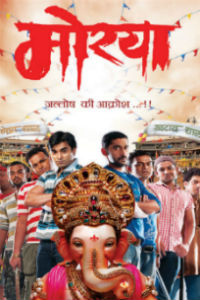 |
Presentor: Everest Entertainment Pvt. Ltd, A Square Entertainment,
Ekvira Productios Pvt. Ltd Producer: Atul Kamble, Avadhoot Gupte Director: Avadhoot Gupte Story: Sachin Darekar Music: Avadhut Gupte Camera: Rahul Jadhav Cast: Santosh Juvekar, Chinmay Mandlekar, Dilip Prabhavalkar, Ganesh Yadav, Janardan Parab, Pushkar Kshotri, Vijay NIkam, Sunil Godse, Sunil Ranade, Vimal Mhatre, Meghana Erande, Pari Telang, Spruha Joshi, Dhanashree Kodegaonkar Movie Review by: Ulhas Shirke |
Social activist Anna Hazare is fighting against corruption in the country. While he is demanding introduction of Janalokpal Bill to bring all political leaders including the Prime Minister answerable to Lokpal; film maker Avadhoot Gupte has tried to uncover the corruption taking place during the biggest festival events in our state.
Through his latest film ‘Morya’, Avadhoot has clearly shown how the youngsters organising the Govinda and Ganapati festivals fall into the trap of political leaders, getting tempted to their sponsorship, while competing with other organisers. Having tried his hands in direction for the first time with ‘Zenda’ his debut film, Avadhoot seems to have gained considerable experience; and this is evident from his latest film ‘Moraya’. He has picked up the right script penned by Sachin Darekar to make this timely film.
The theme of the film is on the backdrop of Govinda and Ganapati community festivals in Mumbai. ‘Moraya’ is based on the rivalry between two groups living in the same area and organising separate community festivals representing Ganesh Chawl Mandal and Khatav Chawl Mandal respectively . So, you find two groups of youngsters led by Manya (Santosh Juvekar) and Sameer (Chinmay Mandlekar) leading their respective mandals. When the redevelopment of the entire area is in the process and knowing that from next year onwards they will have to celebrate a combined community festival; they are suggested to come together. But, that does not happen, as both of them are adamant.
Hotelier Kamat (Dilip Prabhavalkar) who treats both Sameer and Manya like his own sons, also fails to bring them together. In the process both the teams are disqualified from attempting to break the Dahi handi in their area sponsored by a politician. So, Finally they decide to offer the claim of celebration of next year’s Ganesh festival to the Mandal, which attracts maximum number of devotees. The competition begins with raising the funds and in the process both the organisers fall into the trap of selfish politicians belonging to different political parties, who play their dirty game by making them fight with each other.
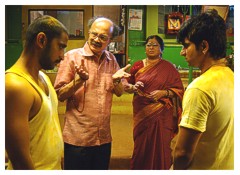
The film, however ends with predictable climax, clearly hinting at such festivals as
political events. It also goes on to show, how in the name of secularism and National integration, the politicians with the help of organisers try to fool the devotees. Through the character of Kamat, the film also sends across a strong message to the organisers of such festivals, as to how they are drifting from the values, by replacing stage plays and Bhajans with item numbers and loud music played by DJ’s. The film also poses few questions, whether the splendor with which such festivals are celebrated and crores of rupees spent, is justified in a state where thousands of farmers are committing suicides. And, whether the global warming genuinely considered during such festivals ?
Music plays an equally important role in this film and hence the director, who also composes the music has paid more attention by skillfully creating space for it, in the screenplay. Be it a Quauwali, a lavani, an item number or an arati ; he has used them at right places. Females don’t find much scope in this male dominated film, yet Spruha Joshi finds a better role while playing the girl friend of Santosh Juvekar. She plays a singer at a Bar. Pari Telang finds another important role of a TV Journalist, who develops a soft corner for Sameer, after she interviews him. Kranti Redkar and Urmila Kanetkar appear in guest roles as celebrity dancers. There are small but important roles coming to the share of Pushkar Shroti, Sunil Ranade, Meghana Erande and Sunil Godse, but it is the hotelier Kamat played by Dilip Prabhavalkar who lives an impression. Avadhoot himself with Subodh Bhave participate in Quawali as guest artistes. Ganesh Yadav has lot to say about the role of Police in a situation where gang riots take place. He is simply remarkable in that role of a Senior Police officer.
‘Moraya’ possesses that elegant look for its superb Cinematography by Rahul Jadhav, who also happens to be the Associate Director of this film. Editing work by Imran Mahadik and Faisal Mahadik is good. Sound design is appropriate to the situation. Screenplay is good and dialogues are well written especially in the second half. In the fist half however, there is lot of repetition in the dialogues, when Sameer and Manya face each other. It is only when at the stroke of interval, the director gives a twist, the confrontation gains momentum with series of dialogues.
‘Moraya’ is a cleverly presented film, with fabulous performances coming from both Chinmay and Santosh. It would be wise not to compare them with each other. Watch them in that last scene when the police officer played by Ganesh Yadav brings them together at an isolated place to voice their agony. With Govinda and Ganapati celebrations almost nearing, the film is likely to receive a good response.
‘Fakta Ladh Mhana!’ changes the face of Marathi films
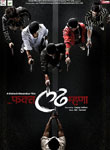 |
Rating: na
Presentor & Producer: Great Maratha Entertainment Company, Twinkle Group & Mirah Entertainment Director: Sanjay Jadhav Story: Mahesh Manjrekar Music: Ajit – Sameer Camera: Sanjay Jadhav Cast: Sachin Khedekar, Sanjay Narvekar, Bharat Jadhav, Siddharth Jadhav, Aniket VIshwasrao, Saksham Kulkarni, Manava Naik, Kranti Redkar, Santosh Juvekar, Vaibhav Mangle, Amruta Khanvilkar, Nagesh Bhosale, Hemangi Kavi, Bhalchandra Kadam Movie Review by: Ulhas Shirke |
If you are under the impression that Marathi films cannot do commercial business as Bollywood films do, then latest Marathi film ‘Fakta Ladh Mhana!’ would prove you wrong. This action packed thriller Produced by Mahesh Waman Manjrekar and directed by Sanjay Jadhav offers all that, a hit Bollywood film posesses. It contains all that masala or in other words the perfect formula to make a film hit. Only drawback is that it is full of violence going on the lines of a typical South film. But, then we should not forget that most of the hit Bollywood films are a remake of those hit Masala South films.
Don’t be surprised if Mahesh Manjrekar decides to do a remake of his own film with top Bollywood actors prepared to play the five man army. Yes, you may give this another name to ‘Fakta Ladh Mhana!’, so much is the impact created by these five finest actors comprising of Bharat Jadhav, Siddharth Jadhav, Aniket Vishwasrao, Santosh Juvekar and Sanjay Narvekar from the Marathi film industry. They combine well to form that team under the leadership of their Don- Babubhai played by none other than Mahesh Manjrekar
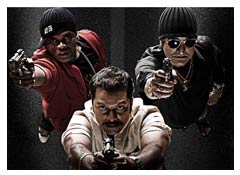
In today’s existing situation, our own politicians have turned villains of the common man. Therefore, the film needed a strong character to perfrom the role of a shrewd Minister and his cunning brother. And, there wouldn’t have been a better choice than going for talented Sachin Khedekar and Sanjay Khapre respectively. The film begins with the sad state of affairs in a village, where politicain turned Industries Minister Patil and his brother with the help of local politician Kulkarni ( Vaibhav Mangale) make the lives of poor farmers miserable forcing them to sale their lands after the SEZ comes into force.
The only opposition comes from an ex-seviceman (Satish Pulekar) who refuses to bow down. He is murdered by Kulkarni and his men but his mentally challenged nephew is the mute witness against Kulkarni. His helpless uncle after witnessing the thumb rule, rushes him to the city in search of an elder nephew( Bharat Jadhav) of the ex-seviceman. Thus begins the revenge. The five man Army comprising of those sharp shooters belonging to the gang of Babubhai then proceed to the village. Some of them carry funny names like West Indies, Kanfatya and Paani Kam ( the little boy who serves tea to the five man army).
Not realising the power of the Minister, the Five man army confront directly with Minister’s brother and Kulkarni, only to be trapped by the shrewd Minister. When they are about to leave the village, another tragedy occurs, when they all swear to finish off the trio comprising of the Minister, his brother and kulkarni one by one. How they plan it and execute it is all that we see in the second part of the film full of action and thrills. As someone has rightly said, “Kuch Paaneke Liye kuch khona bhi padata hai”; the five man Army put up a brave fight against the corrupt system of the Minister forcing him to resign. The film does not end there, as a thrilling climax awaits for a sweet revenge.
Cinematographer turned Director Sanjay Jadhav has cleverly combined this action film with few scenes of emotions besides ccreating that required humour through Sanjay Narvekar and Siddharth Jadhav. Both of them time well with their dilaogues, during tense situations. Bharat Jadhav has a serious type of role having lost his love to Minister’s brother. But, his arguments with Aniket Vishwasrao ( Alex) are well knitted into the screenplay. Aniket plays the character of Alex with full commitment. Above all, it is Santosh Juvekar who impresses in the character of Salim. In one particular scene he tries to explain the difference between a sharp shooter and a terrorist and captures the attention of all.
Kranti Redkar finds a totally different role in this film and she does her part well. Sachin Khedekar, Vaibhav Mangle and Sanjay Khapre play the negative characters with authority. Hemangi Kavi has little for her share, but she plays that small role with total dedication. Amruta Khanvilakr and Manasi Naik have been used to offer a Lavani and Mujra respectively to complete the formula.Vishakha Subhedar finds that small role of Munnibai during the Mujra. The newcomer young boy plays the mentally challenged character well. Dialogues are well written but at many places the Censors have blown their whistle. Mahesh Majrekar as portrayed a Don in his own style.
The film is fast paced, hence not giving much scope to the viewers to question as to how the five man Army manage to move from their hide out to the city and back during the heavy police vigil. But, surprisingly, film has clearly hinted a revolution in this country, if the politicians cross their limits. On the whole, ‘Fakta Ladh Mhana!’ is a complete package filled with that required masala to draw sizable crowds. But, those who deslike violence and bloodshed , should keep themselves away.
‘Platform’ addresses issue on Girl child abuse
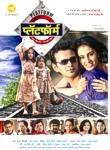 |
Rating: na
Producers: Veena Lokur And Arif Vadgama Director, Story, Dialogues: Veena Lokur Screenplay: Veena Lokur, Shamal Chavan Lyrics: Ashwini Shende Music: Nilesh Moharir Editor: Rajesh Rao Cinematographer: Suresh Deshmane Cast : Mohan Joshi, Sharad Ponkshe, Astad Kale, Prashant Patil, Shubhani Joshi & Sai Lokur Movie Review by: Ulhas Shirke |
After achieving success through her first Marathi production ‘Mission Champion’, Film maker Veena Lokur from Belgaum has now offered one more sensible film ‘Platform'; which speaks about the Girl child abuse in India. Veena Lokur, who also makes her debut as a director through this film, has gone beyond the subject of Female foeticide to show the reality in our society, where girl child is still considered as a burden by the parents; especially in the weaker section of the society.
Through this film, Veena Lokur has launched her daughter Sai, who plays an important central role of Shivani Deshmukh, from a well to do family. Shivani, who is a final year college student, is about to find a campus recruitment and is returning home after attending a workshop; when she witness a horrifying act of parents, who just drop their two daughters into her compartment and run away, as the train leaves a platform after the halt.
Shivani (Sai Lokur) who takes the lead to hand over the girls to the Police, when she reaches her destination. But, she is deserted by all her friends. It is only her best friend Aditya (Astaad kale), who supports her and the two little girls ( aged 4 and 5 yrs) are taken to the Police station. But, at the Police station they experience the reality about the law, besides the child abuse. However, Aditya’s father (Sharad Ponkshe) being a lawyer, suggests them a way out. It looks like all roads are closed for Sai , as the parents of the missing girls cannot be traced. Shivani takes up the custoday of the two girls, much against the wish of her parents (Mohan Joshi and Veena Lokur).
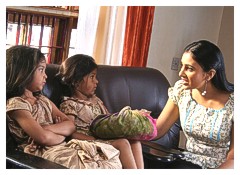
When, Aditya also notices Shivani going out of the way to help the girls and getting emotionally involved in them, he too loses interest in her and leaves for US to take up a job.
He however, keeps in touch with Shivani over phone like a good friend. Shivani separates from her parents and adopts the girls. She takes good care of them, by offering good education for next 11 years. When the girls attain teenage, a particular incident in their life takes them to their past. Shivani has to reveal the true happenning. This is almost towards the climax of the film, when director Veena Lokur concludes her story with an appropriate end.
The film has a strong subject to convey, but to show the actual happening on the platform, her screenplay takes its own time. It is only little before interval, the film actually takes the momentum. To fill up the gaps in the first session, the director has taken help of music, with the inclusion of two songs. Lyricist Ashwini Shende’s fine wordings have received the composition from talented music director Nilesh Moharir.
Cinematographer Suresh Deshmane’s wonderful work is clearly visible, especially in the outdoors. His execution with different camera angles has made the job of director much easier. Being a debutant, Veena Lokur has done her best.
Newcomer Sai Lokur, who also makes her debut as an actress, looks more confident and appealing. She has performed the role of a protagonist with sincerity. Astaad kale, who also plays the leading man for the first time, is at ease and perfectly fits into that role of Aditya. Mohan Joshi and Sharad Ponkshe in the role of parents have nothing much to offer, but they have played their respective roles well. Veena Lokur is just fine in the role of sai’s mother in the film and so are the other characters of the film. The two child artistes and the grown up girls have performed their parts well. The film has already won the State Government award as one of the best films this year. But, to be eligible for international awards, it requires editing, especially in the three songs, except one background and few unwanted scenes in the first session. However, ‘Platform’ does succeed in passing a social message at the most appropriate time. This being a sincere effort from the lady film maker, it is to be appreciated.
‘Superstar’ – a formula based film
|
Rating: na
Presentor & Producer: Sakshi Entertainment Director: Mahendra Kadam Story: Mahendra Kadam, Sachin Mote Music: Ajit – Sameer Camera: Rahul Jadhav Cast: Siddharth Jadhav, Paddy Kamble, Megha, Rajan Tamhane, Nikhil Ratnaparkhi, Nandkishor Choughale, Prashant Tapasvi, Yogini Chowk Movie Review by: Ulhas Shirke |
Generally, a leading artiste who is also the producer of the film, would want himself or herself to be presented with prominence . The latest Marathi film ‘Superstar’ though speaks about the friendship between two standup clowns (Ranga and Bajya) in a Tamasha party from a village called Parambi, it revolves more around the character of an actress – Megha, played by debutant Megha Dhade, who is also the producer of this film. In the process, she has offered a formula based film. If she were a typical Bollywood producer, she would have said, “Meri film mein action hai, fantasy hain, romance hai, emotion hai aur comedy bhi hai”. In short, as a producer of this Marathi film, she has tried to follow the Bollywood path of 70s and 80s.
In this film, Megha comes across Ranga (Siddharth Jadhav), who is a popular clown from a village Parambi. Ranga along with his dear friend Bajya (Pandharinath Kamble) come to the rescue of a Film unit, in their village, when their main artiste gets delayed and the local crowd gathered in a hall goes out of control. Megha is particularly impressed by the act of Ranga and she along with her unit thereafter get an opportunity to witnesses the rehearsal of his folk art. So impressed is the producer (Rajan Tamhane) that he plans to use their theme for a film. He even agrees to make Ranga the new star opposite Megha and even invites his entire team to join the film.
Bajya is bit hesitant having experienced the tragedy of his mother and aunty in the past but, finally gives his nod. Soon he discovers that his original script is changed for the cinematic presentation and the credit being taken by the director (Nikhil Ratnaparakhi). Not only Bajya but his other group members except Ranga are ill treated by the film’s unit. Ranga being in the good books of Megha and being a hard working ambitious artiste, in fact becomes a darling of the unit.
The film’s director Mangesh Kadam has cleverly used this situation to show the difference when a versatile Tamashaa artiste is made to act in the film. Very cleverly he has shown that the creativity is lost in the process. The film picks up considerably better speed to present the screenplay but the frequent songs added in the film interrupt the process. Music is not bad, but it fails to make an impact after you leave the theatre.
Excluding two songs, the other songs were irrelevant in the film’s Author backed story. Even two of the scenes towards the end have been stretched too long. One can understand about branding of a particular product helping to a certain extent in co-sponsorship; but deliberately asking the leading lady in a scene to go into the vanity van and then displaying the product was almost like shooting an ad film into film; giving an awkward look. As it is there was a feature film titled ‘Parambicha Bapu’ being shot into this film and therefore this ad addition looks like an ad played during a short break. The two and half hour film should have been cut to size two hours instead.
Siddharth Jadhav successfully portrays a crazy village boy who later transforms into a self-assured actor with a pride. But, it is his friend played by Pandharinath( Paddy) kamble, who comes up with a memorable performance. Paddy has different shades in his role and the talented actor has proved that he is not only a good comedian but can be considered for emotion filled serious roles too. Being a debutant, Megha Dhade in the role of an actress has given a satisfying performance. There is no doubt that being a producer herself, she has taken more footage, but in the process there has been injustice to other leading lady Yogini Chouk. In the role of Sukhee, the would be of Ranga and sister of Bajya, she just remains a namesake character serving tea and food to the group. In short, a talented actress of her caliber, who has won the Maharashtrachi Superstar TV award, deserved a better deal. Others in supporting cast, especially the other team members of Ranga-Bajya group have performed very well.
Only other actor who got a better deal in this film is Nikhil Ratnaparakhi. While playing a film director’s role, he has proved that acting makes a big difference while portraying any character. No wonder, today he is the most popular model on television ads. Excellent photography by Rahul Jadhav and wonderful art direction by Mahesh Salgaonkar are the two highlights of the film. Overall, the film is filled with good dialogues by Sachin Mote , but some of them were repeated.
Although Superstar sells dreams to village folks with a captivating plot, a more gripping screenplay and clever editing could have made a big difference.
Realistic ‘Janma’ is absorbing
 |
Rating: na
Presenters: Kajalkiran Kanakdhara Films Producers: Tapan Acharya, Kajal Kiran Director: Shirish Rane Story : Anand Mhasvekar Screenplay: Anand Mhasvekar Cinematographer: Rahul Jadhav Cast : Veena Jamkar, Reema, Ashok Shinde, Arun Nalawade, Sanjay Mone, Varsha Usgaonkar Movie Review by: Ulhas Shirke |
We all had heard about this Marathi film ‘Janma’ winning many awards at the film festivals and at the Award functions. But, unfortunately, the film was not finding a distributor for a long time. Finally, last week, the film was released and the makers had a sigh of relief while thanking the good Samaritan Sandeep Patil, who came to their rescue.
‘Janma’ presents a realistic tale in the life of a woman – Vandana Sarpotdar (Reema Lagoo) who is a divorcee mother with her only college going daughter – Nisha (Veena Jamkar) struck by leukemia (blood cancer). She struggles to find matching stem cells and bone marrow for her daughter. When a kind hearted doctor (Ashok Shinde) suggests her that only her blood offspring can have matching cells, she seeks help from a Gynaecologist (Smita Talwalkar).
But, things are not that easy for her, as she is 50 years old. Vandana is prepared to take all chances to save the life of her beloved daughter and takes the risk of delivering a baby. She even manages to persuade her ex-husband (Dilip Gujar) who is in relationship with another woman. Through artificial insemination, they produce the desired results but in the process they face another challenge in their life.
Writer Anand Mhasvekar and Director Shirish Rane have succeeded in presenting a realistic tale in an effective manner through an absorbing screenplay.
Paying more attention on the script, instead of unwanted additions required for cinematic format, the film holds the audience to their seats. Every scene has been presented with perfect home work and deep study of advancing medical science. Watch those scenes where the mother is told by her daughter’s attending doctor that the matching stem cells can be possible through her blood offspring and when the Gynecologist reveals the dangers of getting pregnant at 50.
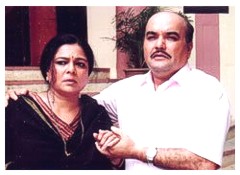
Music does not have much to do with this film, but Mithilesh Patankar has provided a good support to the captivating screenplay. Sachin Natekar’s editing is perfect and so is the camera work by Dhananjay Kulkarni, while capturing all those emotion filled scenes of Mother and daughter. Well suited to his close up shots, all the artistes have performed very well.
This is a film especially for Reema Lagoo and she has given an outstanding performance in that tailor made role. No wonder, she has already won some awards for this role. Veena Jamkar has also played that difficult role of Nisha with confidence. Her body language suggests everything about her ailment. Dilip Gujar has limited role to play, but in two scenes he reacts very well, when he finds two separate rooms booked by his ex-wife and when his wife suggests him for an artificial insemination to serve the purpose. Anand Abhyankar as a well wisher family friend, Ashok Shinde as a doctor at the Cancer Institute and Smita Talwalkar as a Gynecologist, have given a satisfying performance. Others in the college campus are just fine.
The film not only creates that required impact on the audience with its unique attention-grabbing content but also goes on to educate the audience about the progress of medical science.
‘Pangira’ shows the way to Rural sector
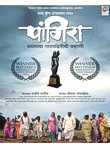 |
Rating: na
Presentor: IDream Production Producer: Shripal Morakhia Director: Rajeev Patil Story: Vishwas Patil Music: Vijay Narayan Camera: Amalendu Chaudhary Cast: Meeta Sawarkar, Pramod Pawar, Kishor Kadam, Santosh Juwekar, Shashank Shende, Chinmay Mandlekar, Dhananjay Mandrekar, Narayan Jadhav, Smita Tambe, Hemangi Kavi, Sharvani Pillai, Prashant Patil, Nandinee Jog, Madhugandha Kulkarni, Girish Salvi, Ravi Tayade and Upendra Limaye, Sai Tamhankar. Movie Review by: Ulhas Shirke |
In our country, while describing a ‘farmer’, the image that comes to our mind is often that of a hapless, debt ridden face full of despair searching for a pesticide bottle to consume and kill himself. In spite of having nearly 60 per cent of India’s population dependent on the agricultural income for their livelihood, we are yet to find freedom for such people.
The latest five year plan says 78% of India’s farmers are small and marginal. They obviously cannot derive any benefits from economies of scale in their small, fragmented holdings. It is only because they are still unorganized sector. Without institutional access to modern technologies or financial services they cannot make investments to improve productivity of their lands. Poor infrastructure and connectivity to power, telecom and roads further compound their competitive disadvantage.
How can we expect an average Indian farmer to become a successful entrepreneur in such an environment ?. In Maharashtra the situation is no different. In fact, it is the worst in some of the villages. Writer Vishwas Patil has rightly described the tragic tale of one such village, where the politicians exploit the villagers with their divide and rule policy. Sajay Patil who gave a cinematic form to this story by developing it and ‘Jogwa’ fame director Rajiv Patil directed it to convey the message to the society and also open the eyes of our selfish politicians with their latest film ‘Pangira’.
‘Pangira’ is actually the name of this village, where all these catastrophic events take place. A young woman Sumitra ( Meeta Sawarkar) enters this village with the support of a retired teacher Appa ( Pramod Pawar) and starts her studies on the management of water resources and Agricultural growth in that village. She soon discovers that the kind of traditional crop grown in that village needs more water and in the scarcity of water and dependency on rains it becomes difficult for the farmers to grow their crop. The right and left hand (Kishor Kadam & Santosh Juvekar) of the local MLA ( Upendra Limaye ) play their dirty games to capture the local village body with the help of their few supporters. They keep on exploiting the poor families by creating infightings among them leading to division of lands and families.
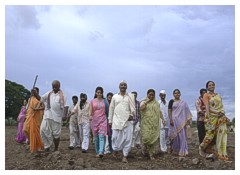
Sumitra with the support of few sensible people living on the upper side of the village dares to challenge the local body and their decisions, when she sees the situation going out of control. She suggests the farmers from the village to grow the crop requiring less water. She also arranges distribution of free saplings with the help of district collector. But, when the entire village take the onions for sale to the market, there is another scene created by the bulk buyers. It comes to the notice that the local MLA has played his hand-n-glove game with bulk buyers; where even Police cannot do anything. The situation again goes out of control, due to the aggressive farmers turning desperate for their rights and police firing is ordered. The sacrifice by some of the villagers finally help achieve peace and prosperity.
‘Pangira’ is a realistic truth of what is happening today in the state of Maharashtra. The film clearly exposes the corrupt system and at the same time educates the farmers, suggesting them to remain united and be self sufficient; learning more and more about latest technologies, rather than becoming dependent on local politicians. Very cleverly the film has shown how the ruling and opposition party people gain their advantages at their cost. It is a social film with a clear timely message, throwing light on today’s burning situation in the state.
Meeta Sawarkar has played the central character with total commitment. She gets very good support from Pramod Pawar, Chinmay Mandlekar, Smita Tambe, Shashank Shende Shravani Pillay and others. Chinmay and Smita playing the helpless husband and wife are simply superb. Smita in particular displayed her real skills through not only emotions but also through her natural body language of a village woman. The way she sits in total squat position anxiously waiting for the result of the bore well drilling, is one of the best scenes in the film. The climax scene showing the agitation of the farmers in the market yard has also been captured well through the lenses of Amalendu Chaudhary. Music by Vijay Narayan goes well in the background for this kind of a film. Rajeev Patil has excelled once again with his skillful direction.
‘Aata Ga Baya’- Comedy of Errors
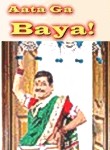 |
Rating: na
Presenter: Katha Productions Producer: Sanjay Narvekar Director: Sanjay Narvekar Story: Yogesh Soman Music: Ajay – Atul, Pankaj – Pushkar Cinematographer: Sandeep Patil Cast: Sanjay Narvekar, Pooja Sawant, Jeetendra Joshi, Atul Parchure, Kamalakar Satpute, Arun Nalawade, Nivedita Saraf, VIju Khote, Pandharinath Kamble Movie Review by: Ulhas Shirke |
Now a days, Marathi films seem to be going on the lines of Drama style comedy. We have just seen it happening inZee Talkies film ‘Mast Chalalay Aamcha’. Now, Sanjay Narvekar’s own film ‘Aata Ga Baya’ copies the same style of comedy, but with a subject that has been witnessed in many Marathi films in the past. Luckily for Marathi Cinema, we have plenty of talented artistes to support each other in any comedy sequence and that becomes easy to set the timing for any scene to create the required laughter.
‘Aata Ga Baya’ written by Yogesh Soman and directed by Sameer deals with the topic of a happy go lucky boy Manya (Sanjay Narvekar) not taking interest in his family business but more keen on marrying the girl -Manee (Puja Sawant) who is the only daughter of Mr. Ghorpade (Arun Nalawde) from a royal family. Finally, they get married with the support of girl’s aunt- Akka (Nivedita Saraf) and boy’s father (Satish Pulekar) besides the blessings of boy’s late Nanee (Sanjivani Jadhav)who speaks only to her family members live from her Portrait.
When the young duo seek her blessings after marriage, she unites them together with her special powers (given by the director) in such a way that their souls enters each other to tackle the situation arising out of the opposition to their marriage and to provide both of them safety from their opponents. This gives enough of scope in the remaining film for a fantasy. Manya’s two friends – Kamlakar Satpute and Pandharinath Kambli join the couple in their fight against their opposition comprising of Mr. Ghorpade, the Police Inspector (Jeetendra Joshi), the girl’s new would be Atul Parchure and his father Mr. Mone (Viju Khote). Manya’s father-in-law does not recognize his marriage and is in a hurry to get his daughter married to Mr. Mone’s son. This hide and seek show goes on till the end of the film creating that required humour, but not enough to make audience laugh spontaneously, as most of the scenes are predictable except the climax.
Looking at the other areas of the film, the music provided by two different pairs doesn’t impress much, except for one of the three songs, where no instruments have been used for creating music of that honeymoon song. The producers claim that the song has received recognition from Guinness Book of World Records. Editing is not to the satisfaction. Even the screenplay is weak. The films drags on till the interval with the screenplay going off track. The 16 reels film should have been sized to 14 reels instead. Looking at the presentation, such a film can only entertain those who love to watch similar type of action comedy on stage.
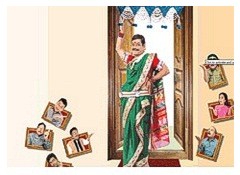
There is wider scope for artistes with spontaneity like the typical button artistes who can quickly change from one form to other. Sanjay Narvekar being a master in this art, ideally suited in that role with his perfect timing for comedy and action together. Being a versatile actor, he shouldered the responsibility on his shoulders; well supported by the entire team comprising of Puja Sawant, Arun Nalwade, Nivedita Saraf, Satish Pulekar, Kamlakar Satpute, Pandhari Kambli, Sanjivani Jadhav, Atul Parchure, Viju Khote, Jitendra Joshi , Pushkar Shrotri and others. Some popular celebrities like Rohini Hattangadi, Shipa Navalkar, Suhas Paranjape, Vishakha Subhedar also join in guest appearance.
With nothing special to offer besides the usual comedy, the film turns out to be an average entertainer.
